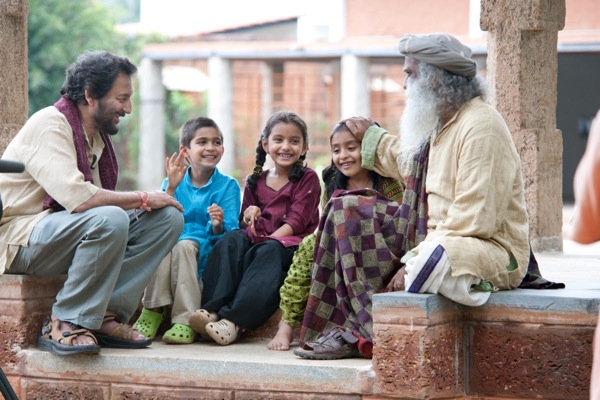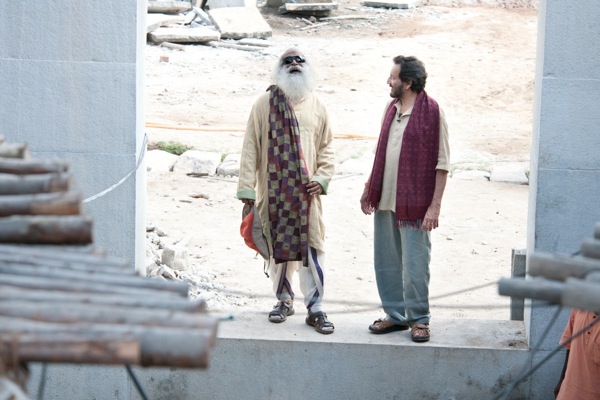

This following is an excerpt from "My Conversations with the Mystic," an interview of Sadhguru by Shekhar Kapur, the director of the Academy-Award winning film "Elizabeth."
Shekhar Kapur: When my daughter was four or five, she asked me, "Daddy, am I living a dream or is this reality?" So I said, "You tell me." She said, "It's both. It's my imagination, and it's reality, both." And in life, this question persists: "Am I living a dream, or is this reality?" But I am afraid that as she grows, with the way she is being educated, these questions will be taken from her.
So, let's talk about childhood and education, and what you are trying to do with the Isha Home School.
Sadhguru: Essentially, education is about enlarging the horizons of human perception. But unfortunately today, education has slowly shifted into a mode where people believe it is about enforcing heaps of information. Information is useful in a certain way, but it is not going to make your life; it will earn your living. So, here at Isha Home School, education is about enlarging a child's horizons, not about giving ready-made answers, but about nurturing an active intelligence which constantly searches and seeks and looks at everything in every possible way. And above all, it is for a child to know the joy of wondering about life.
Shekhar Kapur: Are you saying that these children will come out non-competitive? Or will they have such awareness that their ability to deal with this world will be more precise?
Sadhguru: Suppose you are in competition with me and the two of us are walking together. If you walk a little faster than me, you will think you have reached the peak of your life. If you fall behind me, you will feel depressed that you cannot walk as fast as me. But if you are not in competition with me, you would explore the possibility of what you could do -- and maybe you could fly. But you will miss out on the possibility of flying because you are in competition with me; all you want to do is take a few steps more than me. Human potential is distorted because people are in competition.
Right now, people believe that they will not reach their full potential unless they are in competition, which is a very false idea. Actually, only when a human being is in extended periods of joyfulness and blissfulness will he stretch himself to the limits and do what he can do to the fullest. When he is in competition, when he is in fear of failure, he will only do a little better than somebody else.
So human genius is completely missing today. People are destroying human genius through the process of education, by teaching competition. It is all about getting two marks higher than the person who is sitting next to you.
And in this mode of competition, only one can win. All others are losers. It is a horrible way to create a society. What I am saying is, the gardener in this school is as important for us as the headmistress; that is what the children are constantly perceiving. We do not say these things as philosophies, but that is the atmosphere that is set. The one who cooks and the one who cleans is as important as the one who teaches science, or the one who runs the school, or me, who visits once in a while to give the children a different perspective.
Once you put one above the other, you are not going to know anything in this world. Your whole perspective is distorted. That is the basis of competition, trying to put one above the other. Once you make one thing bigger than the other -- one thing high, one thing low, one thing divine, another thing filthy -- then you miss the whole point of existence. So the essence of education is to enhance your perception in such a way that you are able to perceive a blade of grass as being as important as a coconut tree. It is not less important; it is different, that's all.
Everything that is different in the world has been made it into a discriminatory process. That is why you are suffering a prejudice world. Every difference, whether between races and nations or languages and cultures, and even gender, has been made into a discriminatory process. And that has also been the mode of education, unfortunately.
Here, the most important part of education is not taught; it is a constant demonstration. All the teachers are dedicated people. They are volunteering full-time to make this happen for the children and they are hugely educated. So the key element of the school is the way everybody moves, the way everybody sits and stands and eats and does everything. We are following the ICSE system, but the most important thing is the atmosphere, the ambience, the way it is.
One thing you will see is the strength of the children. The mental strength of the child here is phenomenal. Today, that is one thing that is missing in urban schools. They are becoming flaky. Competition will make them determined and focused in one way, and at the same time, make them fearful of failure, fearful of being less than somebody else. Here, you will see the children don't have that at all in them. Every one of them is a king by himself. [Laughs]
Shekhar Kapur: I noticed that. I've seen the children and what surprises me mostly is that there is a certain sense of alertness in them. When I go back to urban areas, anywhere in the world, I see children walking to school and there's that sense of lack of purpose. But when I see children from the Isha Home School, they seem to be going from one place to the other with a sense of doing and with a lot of happiness.
Sadhguru: For any human being, getting to know something, moving into a new area of life, learning, is always a joyful process. But unfortunately, schooling is not a joyful process for most children. I must tell you this. [Laughs]
 When I was just in my sixth standard, the President of India died. So the school announced that it was a holiday and it would be closed for two days. Then my friends and I met and we said, "Wow! The President died -- this means we get two days off. Suppose the Prime Minister dies, how many days do we get? And if the Chief Minister dies -- how many days?" In our minds, we just started killing the whole cabinet one by one. [Shekhar laughs.] Why is school such a horrible place? Learning is always a joyful experience for any human being.
When I was just in my sixth standard, the President of India died. So the school announced that it was a holiday and it would be closed for two days. Then my friends and I met and we said, "Wow! The President died -- this means we get two days off. Suppose the Prime Minister dies, how many days do we get? And if the Chief Minister dies -- how many days?" In our minds, we just started killing the whole cabinet one by one. [Shekhar laughs.] Why is school such a horrible place? Learning is always a joyful experience for any human being.
Shekhar Kapur: Or it should be.
Sadhguru: It is, actually. When you get to know something new, there is a certain invigoration of energy within you. But that is not happening in schools simply because of the way it is delivered. That is the reason I started this school; I wanted people to be excited about learning. You won't believe it. At 11:00 at night, some children can't sleep. They will say to one of the teachers, "Akka [elder sister], please open the library! I just want to see this one thing. I won't be five minutes, I just want to see something." The child wants to know something before he goes to bed; he can't go to bed without knowing that one thing.
To keep that enthusiasm up, to keep that inquisitiveness up, that longing to know -- that is the job of the teacher; knowing is the child's job. So here, the teacher is just working to keep that up, the longing to know.
***
Isha Home School is located at the Isha Yoga Center outside Coimbatore, India and provides education for children between six and 16 years of age.
On Nov. 22, 2010, Sadhguru and Shekhar Kapur filmed a question-and-answer session on life, which was streamed live on the Web and can be viewed at myconversationswiththemystic.com.
Sadhguru developed Isha Yoga as an invigorating process to transform oneself. For over 25 years, Isha Yoga programs have touched and transformed the lives of millions of people around the world. To learn more, please visit Sadhguru's Huffington Post bio page.
